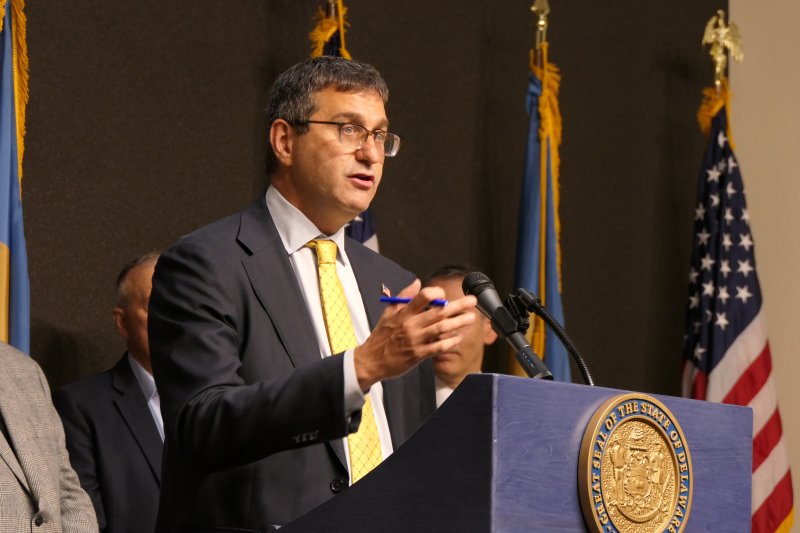Public health bills designed to improve health equity, support families and protect healthcare workers were signed into law Aug. 25.
Senate Bill 12 – the Delaware Pre-Authorization Act of 2025 – sponsored by upstate legislators Senate Majority Leader Bryan Townsend, Sen. Nicole Poore, Speaker of the House Melissa Minor-Brown and Rep. Krista Griffith, speeds up and standardizes health insurance prior authorization.
“Too often patients leave their doctor’s office without knowing whether they’ll be able to access the medications or tests they need; not because of medical uncertainty, but because of insurance delays,” said Townsend in a statement. “The current system puts an unfair burden on patients and providers alike, creating unnecessary stress and delays for everyone. SB12 is a vital step toward a more responsive and patient-centered healthcare system.”
In signing the bills, Gov. Matt Meyer said Delawareans deserve an affordable healthcare system that puts patients first and isn’t stifled by red tape.
“With the Delaware Pre-Authorization Act of 2025, we’re cutting the wait and the paperwork by setting clear timelines, expanding electronic processing and increasing transparency so people get timely, evidence-based care,” Meyer said in a statement. “This is not the only step – and it won’t be the last – but it is an important step as we keep working across the aisle to lower costs and expand access, alongside new laws that protect our healthcare workforce, modernize emergency planning and help rein in prescription drug costs for public employees and retirees.”
Other bills signed into law by Meyer are:
- House Bill 169 to expand the charge of the Behavioral Health Consortium & Prescription Opioid Distribution Commission, adding term limits for appointed members and representation from the Maternal and Child Death Review Board and Delaware’s veteran community
- HB 173 protecting surgical teams from hazardous smoke by requiring healthcare employers to use smoke-evacuation systems during procedures that generate surgical smoke
- HB 148, allowing the Board of Nursing to issue confidential letters of concern about medical providers who have not violated the board’s statute or regulations, but have acted in a questionable manner
- HB 118, which keeps Exceptional Care for Children, a pediatric skilled-nursing facility, exempt from the nursing-facility quality assessment once its Bridge Unit is opened, helping individuals who turn 21 while in ECC’s care transition from a pediatric to an adult setting
- HB 156 updates the Healthcare-Associated Infections Disclosure Act to align with current CDC/NHSN standards and terminology so hospitals and the state are using the same up-to-date definitions and reporting practices
- HB 157 repeals the Hearing Aid Loan Bank Program, which is no longer operational
- HB 158 modernizes public-health emergency planning, renames and updates the Public Health Emergency Planning Commission to the Public Health Emergency Planning Council, requires the statewide plan to be refreshed every two years, and requires the council to meet within 15 days of a declared public-health emergency
- SB 109 enters Delaware into the Social Work Licensure Compact, allowing qualified social workers to practice across compact states, improving workforce mobility and access to mental-health and social-work services for Delawareans
- SB 131 lets dental hygienists administer local anesthesia with dentist supervision, expanding hygienists’ scope, helping more patients get cleanings and periodontal care quickly while keeping safety standards set by the Board of Dentistry & Dental Hygiene.
Not needing the governor’s signature is Senate Joint Resolution 7 that aims to reduce drug costs for state employees and retirees. The resolution directs the State Employee Benefits Committee to use proven strategies when contracting with pharmacy benefit managers, including independent expertise and supply-chain tactics.
Melissa Steele is a staff writer covering the state Legislature, government and police. Her newspaper career spans more than 30 years and includes working for the Delaware State News, Burlington County Times, The News Journal, Dover Post and Milford Beacon before coming to the Cape Gazette in 2012. Her work has received numerous awards, most notably a Pulitzer Prize-adjudicated investigative piece, and a runner-up for the MDDC James S. Keat Freedom of Information Award.





















































